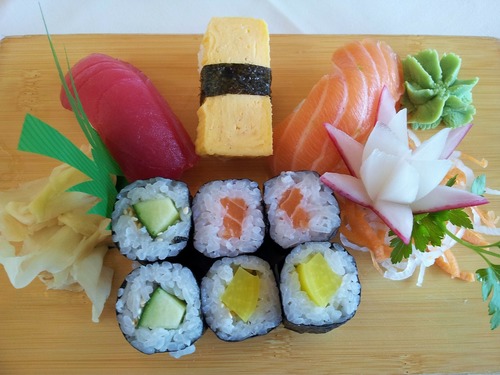Short answer
Sushi is bad for you. In spite of the many health benefits provided through fish, contaminants in the water create grave danger for consumers. There are some areas where sushi can be safely consumed when prepped and stored properly.
Recommended Alternative
Long answer
Sushi is quickly becoming one of the most popular dishes in America and with ingredients like fish, vegetables, and seaweed-- the nutrition facts speak for themselves. However, sushi has a concerning story to tell, and one should be aware of the whole story before reaching for their favorite roll.
Sushi is a temperamental food and has the potential to cause severe illness and even death. Because sushi is raw, it can be a breeding ground for potential parasites and bacteria. One of the major risks with consuming fish that hasn’t been kept at an appropriate temperature is Scombroid food poisoning, which results in abdominal pain, nausea, diarrhea, fast heart rate and pounding headaches. Parasites like Anisakidae and Tapeworm, although rare also pose additional risks.
Always ensure you are eating sushi from a reputable, and knowledgeable establishment. Fish should always be kept in the appropriate conditions, including correct temperatures, and stored at that temperature for the required time to deem safe.
Bacteria and parasites aren’t the only concerns that exist inside the fish itself. Recent studies are looking at the potential outcomes on wildlife since the March 2011 Fukushima disaster on the coast of Japan. Since 2011 highly radioactive elements have been contaminating water in the Pacific Ocean. The waters surrounding Japan have been shown to contain caesium 137, strontium 90, and plutonium 239, since the disaster (certain isotopes of plutonium are some of the deadliest substances on Earth). The contamination has spread across the Pacific Ocean and has been confirmed in the waters of Hawaiian islands and in areas of the Pacific Ocean surrounding the United States. For more information regarding the impact of Fukushima visit http://www.globalresearch.ca/the-fukushima-endgame/5420188.
This is problematic because a large amount of fish used for sushi comes from the waters of Japan and the Pacific Ocean. Because the fish inhabit this area, contamination has been present in fluctuating levels over the past few years. The USDA has consistently reported that known radiation levels in fish in the US should not be cause for concern regarding human consumption. However, the Fukushima disaster has been largely kept quiet in the media and among governmental agencies, in hopes to spare the fishing industry from a catastrophic decline. An increasing concern is that Japan continues to release the harmful radioactive isotopes into the water, constantly raising risks for additional contamination.
Still, when it comes to sushi, it is important to always do your research and stay informed. Understanding where your fish came from, how it was stored and prepared, and the potential risks is key when it comes to consuming sushi.
Possible short-term side effects
- food poisoning (improperly stored/prepped)
Possible long-term side effects
- deadly radioactive contaminates (pacific ocean)
- contraction of parasites
Ingredients to be aware of
- parasites / bacteria
- caesium 137
- strontium 90
- plutonium 239

Benefits
- great for weight loss
- source of omega-3 fatty acids
- packed with vitamins and minerals
Healthier alternatives
- fully cooked fish (from the atlantic ocean)
- sushi made without fish / cooked fish (from the atlantic ocean)
Our Wellness Pick (what is this?)
Annie Chun's Seaweed Snacks
- Keto-friendly
- Light and airy
- Organic ingredients
- Gluten and dairy-free
- Vegan snack
 Approved by
Approved by 















